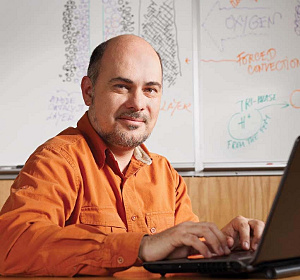Научный доклад профессора П. Атанассова 30 апреля 2013 года
Приглашаем посетить научный семинар на тему «Non-platinum Catalysts for Fuel Cells», который состоится в 16:00 во вторник, 30 апреля, в аудитории 446 Химического факультета МГУ. Доклад сделает профессор Plamen Atanassov, The University of New Mexico. Если у вас нет пропуска в МГУ, для посещения семинара сообщите свои ФИО и место работы А.В. Чертовичу по электронной почте.
Аннотация лекции
Fuel cells, which directly convert a fuel’s chemical energy into electricity by electrochemical reactions, are a key enabling technology for the transition to a hydrogen-based economy. Of several different types under development, a polymer electrolyte fuel cell (PEFC) is generally recognized as a future power source for zero-emission vehicles. To become commercially viable, however, PEFCs must address several formidable technological and economic challenges. Only after overcoming these hurdles will fuel cells take their place as a centerpiece of a hydrogen economy and position hydrogen as a major energy carrier, lessening concerns regarding the energy security and environmental impact of fossil fuels. The high cost of catalysts due to the exclusive use of platinum and platinum-based catalysts in fuel cell electrodes is one such challenge.
Информация о лекторе

Plamen Atanassov grew up in Bulgaria and graduated from the University of Sofia in 1987 specializing in Chemical Physics and Theoretical Chemistry. He joined the Bulgarian Academy of Sciences and become a Member of Technical Staff of its Central Laboratory of Electrochemical Power Sources (now the Institute for Electrochemistry and Power Systems). His initial work included materials solutions for metal-air batteries. During 1988/89, Plamen Atanassov was a visiting scientist in the Frumkin’s Institute of Electrochemistry, Moscow, Russia studying bio-electrochemistry of enzymes. He received his doctorate from the Bulgarian Academy of Sciences in Physical Chemistry, specializing in Electrochemistry under the guidance of Prof. Ilia Iliev and Prof. Evgeni Budevski.
Plamen Atanassov moved to the United States in 1992 and later became a research faculty with the University of New Mexico. During this period he was involved in development of a several electrochemical biosensor technologies for biomedical, environmental food safety and defense applications. In 1999 Plamen Atanassov joined Superior MicroPowders LLC (now Cabot-SMP) were he was a project leader in fuel cell electrocatalysts development. He returned to the University of New Mexico in 2000 as faculty member of the Chemical and Nuclear Engineering Department.
In October 2007 Plamen Atanassov founded the UNM Center for Emerging Energy Technologies and was its Director till December 2011. Prior to that Plamen Atanassov was UNM Director for the NSF Industry/University Collaborative Research Center. He was the PI on AFOSR MURI “Fundamentals and Bioengineering of Enzymatic Fuel Cells”, which includes faculty from Columbia University, Northeastern University, Michigan State University, St. Louis University and University of Hawaii. Plamen Atanassov is currently the PI of the New Mexico DOE EPSCoR Implementation Award “Materials for Energy Conversion”, a concerted effort of UNM, New Mexico Tech, New Mexico State and Eastern New Mexico Universities. He has standing collaborations with scientists from LANL, SNL, NREL, ANL, ORNL, LBNL and funded programs with industrial partners such as: Toyota/Daihatsu, Ballard, Sharp, Cabot, IRD, CFDRC and Lynntech. Plamen Atanassov ‘s research programs include development of non-platinum electrocatalyst for fuel cells, new materials and technologies for micro-power sources, enzymatic bio-fuel cells, sensor systems design and integration of micro-analytical systems. Starting January 2012 Plamen Atanassov serves as an Associate Dean for Research of the UNM School of Engineering.
